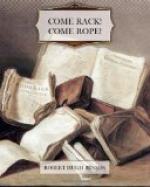* * * * *
Padley Hall was just such a house as would serve a wealthy gentleman who desired a small country estate with sufficient dignity and not too many responsibilities. It stood upon the side of the hill, well set-up above the damps of the valley, yet protected from the north-easterly winds by the higher slopes, on the tops of which lay Burbage Moor, where the hawking was to be held. On the south, over the valley, stood out the modest hall and buttery (as, indeed, they stand to this day), with a door between them, well buttressed in two places upon the falling ground, in one by a chimney, in the other by a slope of masonry; and behind these buildings stood the rest of the court, the stables, the wash-house, the bake-house and such like, below; and, above, the sleeping rooms for the family and the servants. On the first floor, above the buttery and the hall, were situated the ladies’ parlour and chapel; for this, at least, Padley had, however little its dignity in other matters, that it retained its chapel served in these sorrowful days not, as once, by a chaplain, but by whatever travelling priest might be there.
* * * * *
Robin entered through the great gate on the east side—a dark entrance kept by a porter who saluted him—and rode through into the court; and here, indeed, was the company; for out of the windows of the low hall on his left came a babble of tongues, while two or three gentlemen with pots in their hands saluted him from the passage door, telling him that Mr. Thomas FitzHerbert was within. Mr. Fenton was one of these, come over from North Lees, where he had his manor, a brisk, middle-aged man, dressed soberly and well, with a pointed beard and pleasant, dancing eyes.
“And Mr. John, too, came last night,” he said; “but he will not hawk with us. He is ridden from London on private matters.”
It was an exceedingly gay sight on which Robin looked as he turned into the hall. It was a low room, ceiled in oak and wainscoted half-way up, a trifle dark, since it was lighted only by one or two little windows on either side, yet warm and hospitable looking; with a great fire burning in a chimney on the south side, and perhaps a dozen and a half persons sitting over their food and drink, since they were dining early to-day to have the longer time for sport.
A voice hailed him as he came in; and he went up to pay his respects to Mr. John FitzHerbert, a tall man, well past middle-age, who sat with his hat on his head, at the centre of the high table, with the arms of Eyre and FitzHerbert beneath the canopy, all emblazoned, to do the honours of the day.
“You are late, sir, you are late!” he cried out genially. “We are just done.”
Robin saluted him. He liked this man, though he did not know him very well; for he was continually about the country, now in London, now at Norbury, now at Swinnerton, always occupied with these endless matters of fines and recusancy.




